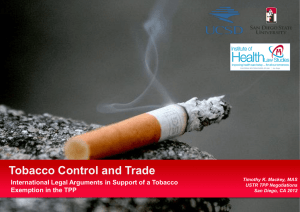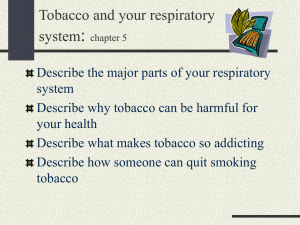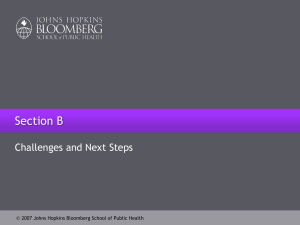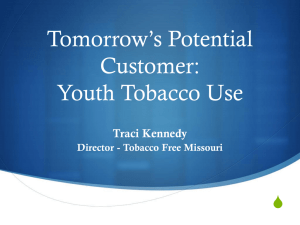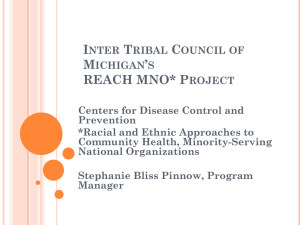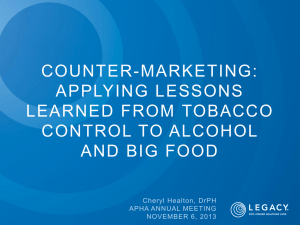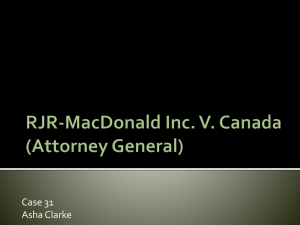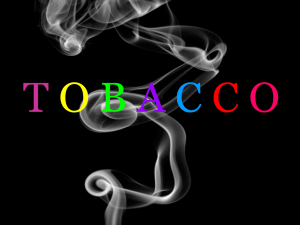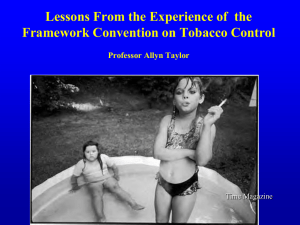Tobacco Control & WHO FCTC
advertisement
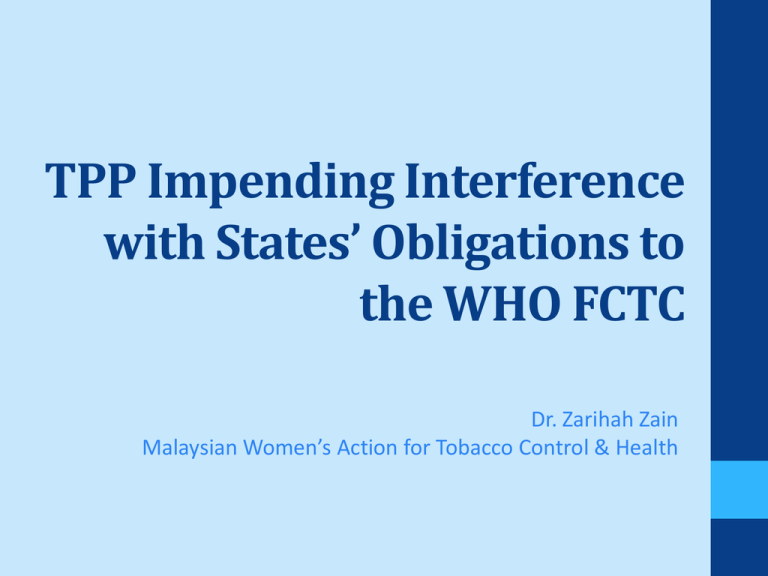
TPP Impending Interference with States’ Obligations to the WHO FCTC Dr. Zarihah Zain Malaysian Women’s Action for Tobacco Control & Health Tobacco Product – Very Unique Commodity Proven to be exceptionally harmful to life • Causes serious/ fatal diseases (e.g. cancers, cardiovascular diseases, respiratory diseases) • Causes premature deaths (1 billion deaths in 21st century) • Issues of second-hand & third-hand smoke • SMOKE FREE AIR IS A HUMAN RIGHT • Nicotine in tobacco is a highly addictive drug Yet….. legal & widely available • tobacco is the only legally available consumer product that kills when used as intended Tobacco Product – Very Unique Commodity Economic Losses from Smoking • • Lowered/ loss productivity Health costs to treat tobacco-related diseases (per year) • Australia : USD 1,353m • Chile : USD 1,140m • Canada : USD 2,803m • Malaysia : USD 922m • Mexico: USD 5,700m • New Zealand : USD 166m • Singapore : USD 50m • United States : USD 96,000m • Vietnam : USD 78m Source: The Tobacco Atlas, 4th Edition www.tobaccoatlas.org/cost/society/smokingCost_GDP/ WHO Framework Convention on Tobacco Control (WHO FCTC) Tobacco is the only legal product that has an international treaty enacted to control the global as well as local supply and demand • • • • An evidence-based tool Legally binding Came into force in 2005 Currently has 168 signatories and 176 parties All TPP countries, except the United States are Parties to the FCTC. However, the US is a Signatory since May 2004 Article 2.2 of the WHO FCTC • Does not prevent Parties from entering into agreements that may cover tobacco products, BUT it requires that these be compatible with their obligations under the Convention and its protocols TPP Areas in Potential Conflict with the WHO FCTC • Goods Chapter • Cross Border Trade in Services Chapter • Technical Barrier to Trade Chapter • Investment Chapter • Intellectual Property Chapter • Transparency Chapter • Regulatory Coherence Goods Chapter Likely TPP Provision • Elimination of Customs Duties Tobacco Control/ WHO FCTC • It is scientifically proven that raising tobacco tax and prices are the most effective short-term strategies to reduce demand for tobacco • Article 6 : Parties to implement effective price and tax measures Cross Border Trade in Services Likely TPP Provision • Promotes liberalisation • Bans/ restrictions may not be permitted Tobacco Control/ WHO FCTC • TPP may hamper rights of Parties to regulate tobacco wherever/ however appropriate • Article 13 : require restrictions on tobacco advertising, promotion and sponsorship including cross-border advertising Technical Barrier to Trade Likely TPP Provision • Avoidance of “unnecessary obstacles” to trade • TPP may provide strong grounds for tobacco companies in investor state dispute cases Tobacco Control/ WHO FCTC • There are many provisions in the FCTC that may be argued as TBT, e.g. • Article 9 : Product regulations/ control of tobacco product contents and emissions • Article 11 : Packaging & labelling • Etc. Investment Chapter Likely TPP Provision • Protects existing investments at the time the TPP starts operating as well as new investments/ expanded investments after the TPP comes into force Tobacco Control/ WHO FCTC • TPP may negate the rights of Governments to effectively protect the health of its citizens from tobacco harm • Rights to regulate any entities that relate to FCTC provisions and in response to tobacco industry actions that frequently identify possible loopholes and find new ways to get around existing laws not guaranteed Transparency Chapter Likely TPP Provision • Requires Parties to allow (to the extent possible) interested persons to comment on proposed laws/ regulations etc. Tobacco Control/ WHO FCTC • Such TPP obligations could provide opportunities for pressure and evidential material for subsequent disputes • The tobacco industries will have advantages to challenge tobacco control measures in domestic proceedings WHY is it that TPP negotiation process don’t adhere to similar transparency? Regulatory Coherence Likely TPP Provision • Include regulatory impact assessments (RIAs) Tobacco Control/ WHO FCTC • Provisions in this TPP chapter pose serious challenges to tobacco control policies • Extensive documentation that needs to be produced published to meet RIA requirement • Likely to restrict the ability to regulate tobacco Legal Costs to Government • TTC Philip Morris, has filed a case against Uruguay and Australia • Legal costs to governments may come to $45million; • Damages/compensation awarded that govt. has to pay the winning investor can be US$billions. WHO FCTC Article 5.3 Recommendations 7.1: the tobacco industry must not be given any incentives to run its business Tobacco Control & WHO FCTC • All TPP countries (except U.S.) have legal obligation to implement the WHO FCTC in their respective countries • All responsible govt. will put the rights and general interests of its citizens before foreign investors’ profits • It is most bizarre that those marketing a product that is addictive and kills at least 50% of its consumers and others around them should be given any privileges To avoid potential conflict between the TPP and the WHO FCTC as well as to ensure freedom to enact tobacco control measures to protect public health, FCTC Parties in the TPP could seek a complete carve-out tobacco from the trade agreement in the same way that military products, arms, narcotics/drugs, and hazardous wastes are expressly excluded from such agreements. As a signatory to the WHO FCTC, the US still have a role towards international tobacco control through the Clinton Order EO 13193 and Doggett Amendment which provide guidance on tobacco trade. The proposed safe harbor may not necessarily address all concerns of the WHO FCTC . Complete tobacco curve out from TPP is consistent with countries’ obligations to the WHO FCTC Former ASEAN Secretary General, Dr Surin Pitsuwan: “We should not just have free trade, but rather fair trade & more importantly SAFE TRADE”


